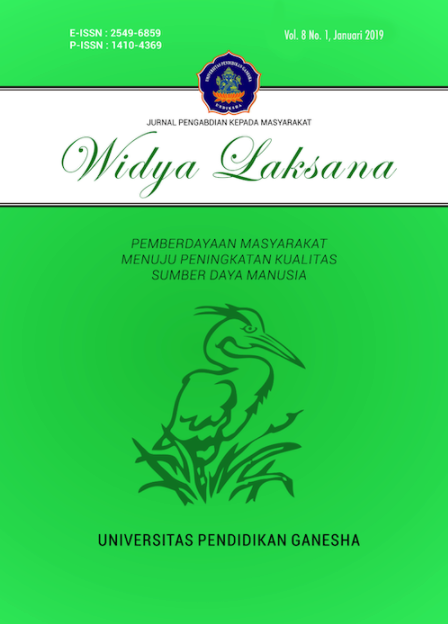ICT LITERACY FOR ENGLISH TEACHER IN NUSA PENIDA DISTRICT- BALI
DOI:
https://doi.org/10.23887/jwl.v6i2.11460Abstract
The English teacher in Nusa Penida district, Klungkung regency almost applied teacher centered method in teaching and learning process. It was caused by the sources of learning was only from the teacher and book that was used in the class. It made teaching and learning process became monotone and bored. Reflected to that problem, IBM team build relationship with the group of English teacher of Junior High School in Nusa Penida in order to improve competency of the used of ICT as the tool used in teaching and learning activity. The method that was used to train the English teacher was apprentice training by implementing cognitive apprenticeship model. This IBM had been conduted for 8 months and it resulted: (1) the competency of English teacher in operating ICT during teaching and learning proess in the class was improved, (2) the English teacher’s respond that used cognitive apprenticeship model during the training activity were positive. It could be seen from the Englisgh teachers’ enthusiasm during the training activity.
Key words: ICT, model cognitive apprenticeship, English TeacherReferences
Andersen, Hansen, Tamargo, Jeppesen, Krismundsson. 2001. Information and Communication Technology & Special Education Needs. Availble at: http://www.europa.eu.int/comm/education/socrates/actions.htm
Collin, A. 1991. Cognitive Apprenticeship and Instructional Technology. Hillsdate, N.J:Erlbaum.
Deido, Cameroon. 2004. Enhancing Learning and Teaching Using ICTs. Neleawa Comfort Zee Multimedia.
Dinas Pendidikan.2012.RPJM Dinas Pendidikan Kabupaten Klungkung. Bali
Evgueni Khvilon. 2002. Information and Communication Technologies in Teacher Education. Division of Higher Education. Unesco.
Kikas. 2001. Learning in Internet: A challenge for School Education. Available online: http://www.ebdoc.ubn.nl
Downloads
Published
Issue
Section
License
Authors who publish with the Widya Laksana agree to the following terms:- Authors retain copyright and grant the journal the right of first publication with the work simultaneously licensed under a Creative Commons Attribution License (CC BY-SA 4.0) that allows others to share the work with an acknowledgment of the work's authorship and initial publication in this journal
- Authors are able to enter into separate, additional contractual arrangements for the non-exclusive distribution of the journal's published version of the work (e.g., post it to an institutional repository or publish it in a book), with an acknowledgment of its initial publication in this journal.
- Authors are permitted and encouraged to post their work online (e.g., in institutional repositories or on their website) prior to and during the submission process, as it can lead to productive exchanges, as well as earlier and greater citation of published work. (See The Effect of Open Access)



